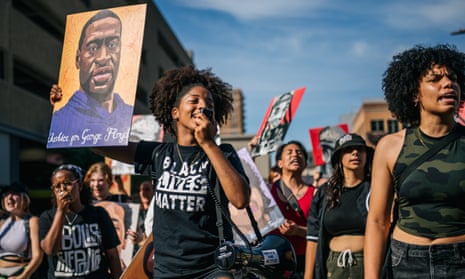Two years to the day since George Floyd was murdered by a white police officer in Minneapolis, Joe Biden stood in the White House and signed an executive order he argued should instill optimism and hope among reform advocates across the country.
It was late afternoon in the spring of this year, and among the attendees were members of Floyd’s family and the family of Breonna Taylor, the 26-year-old Black woman killed by police in Louisville, Kentucky, shortly before Floyd’s death.
“This executive order is going to deliver the most significant police reform in decades,” the president said.
Biden had placed broad police reform as a central campaign issue in a bold criminal justice platform, but two years on, and despite the rhetorical optimism on that signing day, the issue remains as intractable as it is complex.
The executive order was signed after the administration abandoned its pledge to create a national police oversight commission, instead focusing efforts to pass the George Floyd Justice in Policing Act through Congress.
But the sweeping legislation, which included meaningful efforts to end the use of police chokeholds, mandate the collection of data related to fatal use of force and amend criminal statutes allowing for broader federal prosecution of police officers, has sunk amid partisan point-scoring and the slimmest of Democratic majorities in the US Senate.
Biden has actively criticized the polarizing notion of “defunding the police”, but nonetheless, some of the ambitious promises of his campaign have still collided with the reality of Washington.
For the most part, the administration’s order is a symbolic statement of intent or a reinforcement of already existing policy, without the bite to meaningfully affect the majority of America’s 18,000 local police forces over which the federal government has extremely limited oversight. It includes a new national database of police misconduct, mandatory for federal law enforcement but entirely voluntary for local, and a ban on chokeholds for federal law enforcement but little provision to encourage local police to follow suit.
The total number of people killed by American police, about 1,110 a year, has remained near constant since media efforts to document them began in 2015.
Meanwhile, the window for broader bipartisan criminal justice reform appears to have shrunk even further, as many Republicans distance themselves from the tentative gains made in the First Step Act, signed into law by Donald Trump.
Instead, throughout the midterm election season, Republicans fell back on the “tough on crime” rhetoric that has supported America’s mass incarceration crisis for decades.
Progressive officials at the local level, including reformist district attorneys such as Larry Krasner in Philadelphia and Andrew Warren in Tampa, Florida, have seen themselves directly targeted as a result of this regression to the hard right.
In Florida, the far-right governor, Ron DeSantis, suspended Warren for his refusal to enforce the state’s hardline anti-abortion laws. In Philadelphia, Krasner faces a Republican-led impeachment process in the state legislature, accused of contributing to the city’s increasing gun violence because of progressive reforms. (Krasner has labeled the process unconstitutional, and academic research has concluded there is no evidence to link reformist prosecutors with rising violent crime.)
But it is also in these localities where some of the most significant victories for progressives have quietly occurred. In New Orleans, historically a center of mass incarceration, a newly formed civil rights division in the reformist DA’s office has become among the most active in the country, intervening in over 240 individual cases in less than two years to address past harms in the local criminal legal system. Most of these, including 17 instances where convictions have been entirely vacated without re-prosecution, have led to immediate release from prison.
Another landmark moment occurred this October, when Biden issued thousands of pardons to people convicted under federal law for simple marijuana possession, under pressure from progressives in Congress.
For many, the narrow pardons did not go far enough, and applied to only a slim portion of the population convicted for low-level marijuana related offenses. But for those on the right, the move was lambasted as another “soft on crime” decision and, despite the president’s urge for state governors to follow suit, in the states where possession remains fully or mostly illegal, there is little to suggest this will occur.
Following four years under Donald Trump when the justice department refrained from intervening in problematic local policing practices, the Biden administration has continued to reverse this trend. Most notably this year in Louisiana, where the justice department commenced a civil rights investigation into the state police force, accused of routine rights violations against Black citizens in the wake of the brutal death of motorist Ronald Greene.
Earlier this month, five officers involved in the killing were charged with offenses including homicide. The charges came over three and a half years after the incident took place, with authorities accused of a cover-up following the eventual publication of video depicting the beating, published by the Associated Press.
The fatal encounter bears some similarity to the death of Kevin Desir, a Black man who died after being forcibly restrained by sheriff’s deputies in a notorious jail in Florida, which occurred almost two years ago. The fatality, which had received scant national coverage, was re-examined in a Guardian investigation last month. While all officers involved in the violent restraint were cleared of criminal wrongdoing, a new private autopsy concluded the father of two had died due to manual strangulation and found the death was a homicide.
Authorities still refuse to release the CCTV footage of the incident, leaving many open questions, as Desir’s family continue to allege a cover-up.
Answers often remain elusive. And for so many, justice is still distant.
